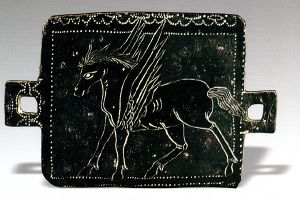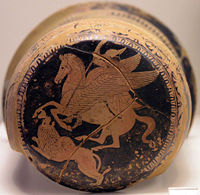Pegasus
- For other uses, see Pegasus (disambiguation).
- "Flying Horses" redirects here.
In Greek mythology, Pegasus (Greek: Πήγασος (Pégasos)) was a winged horse that was the son of Poseidon, in his role as horse-god, and the Gorgon Medusa. Depending on the historical source, the plural for pegasus is pegasi or pegasuses.
Descriptions vary as to the winged stallion's birth and his brother the giant, Chrysaor; some say that they sprang from Medusa's neck as Perseus beheaded her, a "higher" birth, like the birth of Athena from the head of Zeus. Others says that they were born of the earth as Medusa's blood spilled onto it, in which case Poseidon would not be their sire. A variation on this story holds that they were formed from the mingling of Medusa's blood and the sea foam, thus including Poseidon in their making. Athena caught and tamed Pegasus, and presented him to the Muses at Parnassus. After he became the horse of the Muses, he was at the service of the poets.
Hesiod connects the name Pegasos with the word for "spring, well", pēgē; everywhere the winged horse struck hoof to earth, an inspiring spring burst forth: one on the Muses' Mount Helicon, the Hippocrene ("horse spring"), at the behest of Poseidon to prevent the mountain swelling too much and another at Troezen. The actual etymology of the name is most likely from Luwian pihassas "lightning", or pihassasas, a weather god (the god of lightning). In Hesiod, Pegasos is still associated with this original significance by carrying the thunderbolts for Zeus.

Pegasus aided the hero Bellerophon, who is a double in some way for Perseus, in his fight against both the Chimera and the Amazons. There are varying tales as to how Bellerophon found Pegasus; the most common says that the hero was told by Polyidus to sleep in the temple of Athena, where the goddess visited him in the night and presented him with a golden bridle. The next morning, still clutching the bridle, he found Pegasus drinking at the Pierian spring. When the steed saw the bridle, he approached Bellerophon and allowed him to ride.
Prior to aiding Bellerophon, Pegasus brought thunderbolts to Zeus, and following Bellerophon's death he returned to Mount Olympus to aid the gods. In his later life, Pegasus took a wife, Euippe (or Ocyrrhoe) This family is the origin of the winged horses.
Pegasus was eventually turned into a constellation, but a single feather fell to the earth near the city of Tarsus (hence its name).
The word "pegasus" is sometimes used to refer to any winged horse. A horned pegasus, or a pegasus with a unicorn's horn, is also known as an alicorn.
See also
- Pegasus (constellation)
- Pegasus (computer)
- Buraq
Credits
New World Encyclopedia writers and editors rewrote and completed the Wikipedia article in accordance with New World Encyclopedia standards. This article abides by terms of the Creative Commons CC-by-sa 3.0 License (CC-by-sa), which may be used and disseminated with proper attribution. Credit is due under the terms of this license that can reference both the New World Encyclopedia contributors and the selfless volunteer contributors of the Wikimedia Foundation. To cite this article click here for a list of acceptable citing formats.The history of earlier contributions by wikipedians is accessible to researchers here:
The history of this article since it was imported to New World Encyclopedia:
Note: Some restrictions may apply to use of individual images which are separately licensed.

